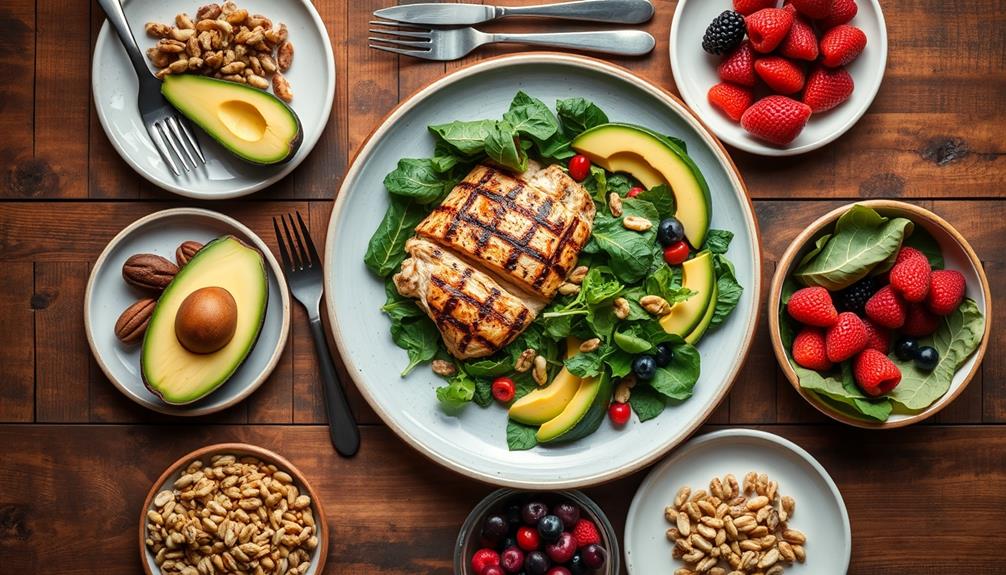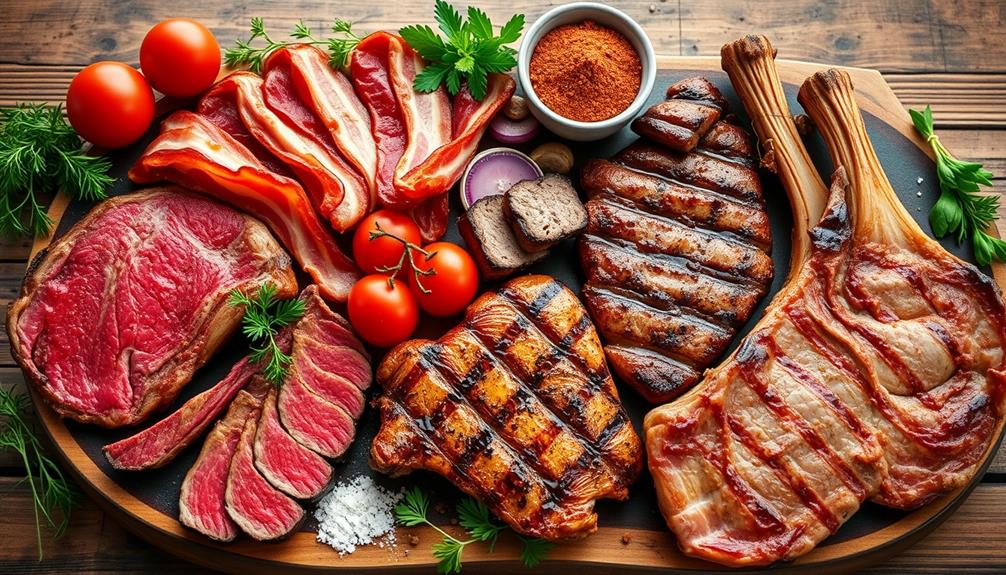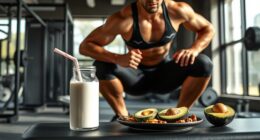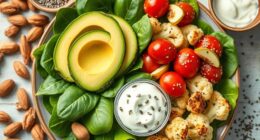The best easy keto diet plan focuses on cutting carbs to under 20 grams daily while embracing delicious, high-fat foods. You'll enjoy avocados, fatty fish, and nuts that keep you satisfied. By planning your meals ahead, you can avoid impulse eating and stick to your goals. Remember to include non-starchy veggies like spinach and broccoli for essential nutrients. Hydrate with water or unsweetened teas, and keep keto-friendly snacks handy. This approach not only helps you lose weight but also improves your overall health. Stay tuned for tips on meal planning and snacks that make your keto journey easier! When it comes to keto diet essentials, it’s important to focus on quality fats, moderate protein, and minimal carbs. Incorporating healthy fats like olive oil and coconut oil as well as grass-fed meats and pasture-raised eggs can support your body’s nutritional needs. It’s also essential to pay attention to portion sizes and listen to your body’s hunger and fullness cues to maintain a healthy balance while on the keto diet. By including these essentials in your meal planning, you can set yourself up for success in reaching your health and fitness goals. To make meal planning even easier, consider using a top keto diet app to track your macros and find new recipes to try. These apps can provide personalized recommendations and support to help you stay on track. With the right tools and mindset, you can make the keto diet a sustainable and enjoyable lifestyle choice.
Key Takeaways
- Focus on meal planning with high-fat, low-carb foods like avocados, fatty fish, and non-starchy vegetables to stay within carb limits.
- Prepare a shopping list to avoid high-carb items and stock up on keto-friendly snacks like hard-boiled eggs and cheese.
- Incorporate healthy fats, such as olive oil and nuts, to support overall health and enhance flavor in meals.
- Utilize apps and tools for tracking macronutrients, ensuring you maintain the correct ratios for a successful keto diet.
- Consider batch cooking to save time and make adherence to your keto plan easier throughout the week.
Understanding the Keto Diet
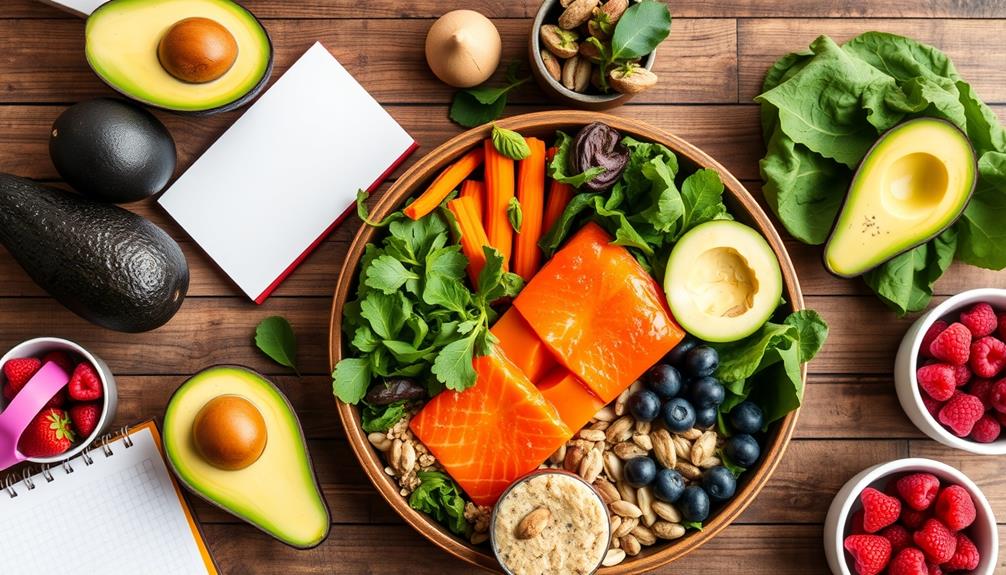
Understanding the keto diet can feel overwhelming at first, but it doesn't have to be. The ketogenic diet focuses on drastically reducing your carbohydrate intake, typically to under 20 grams daily. This low-carb diet shifts your body into a metabolic state called ketosis, where it starts burning fat for energy instead of glucose.
To maintain this state, you'll need to pay close attention to your macronutrient ratios, aiming for about 70-80% of your calories from fats, 10-20% from protein, and just 5-10% from carbs. Incorporating healthy fats can also support overall health and potentially reduce inflammation, similar to recommendations for a gout-friendly diet.
Meal planning is essential for success on the keto diet. It helps you stick to these ratios and prevents impulsive eating. You'll want to fill your meals with healthy foods that align with this high-fat diet, like avocados, cheese, nuts, and oils.
Starchy foods such as bread, pasta, and sugary snacks must be limited. By focusing on whole foods, you'll not only support your weight loss goals but also enhance your overall well-being. Embrace the journey, and remember that with careful planning, you can thrive on the ketogenic diet.
Key Benefits and Potential Risks
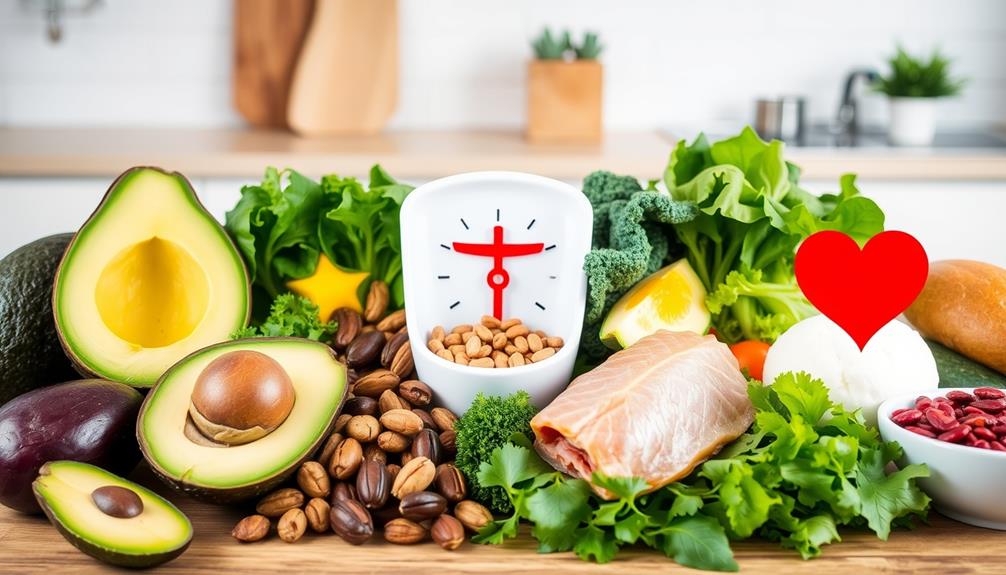
The keto diet offers several key benefits, but it also comes with potential risks that you should be aware of. Here's what you need to know:
- Weight loss can be significant, especially in the initial stages. By focusing on low-carb, high-fat food choices, many individuals find it easier to adhere to their dietary goals. The diet may improve insulin sensitivity, benefiting those with type 2 diabetes, making it important to evaluate effective strategies for weight loss.
- Careful meal planning is essential to avoid nutrient deficiencies.
- High saturated fat intake might elevate LDL cholesterol, posing cardiovascular risks.
Adopting a keto diet plan can help you shed pounds quickly, primarily due to reduced water weight and a shift to fat burning for energy. You might also experience improved glycemic control, which can lessen your reliance on diabetes medication.
However, watch out for the "keto flu," which may affect about one-third of beginners, causing headaches and fatigue.
Long-term adherence can lead to nutrient deficiencies due to limited food variety. As a result, you'll need to be mindful of your carbohydrate intake and evaluate supplementation.
Furthermore, the high saturated fat intake could raise your LDL cholesterol, particularly if you have pre-existing conditions. Balancing these benefits and risks is vital for your success on the keto journey.
Simple Meal Planning Tips
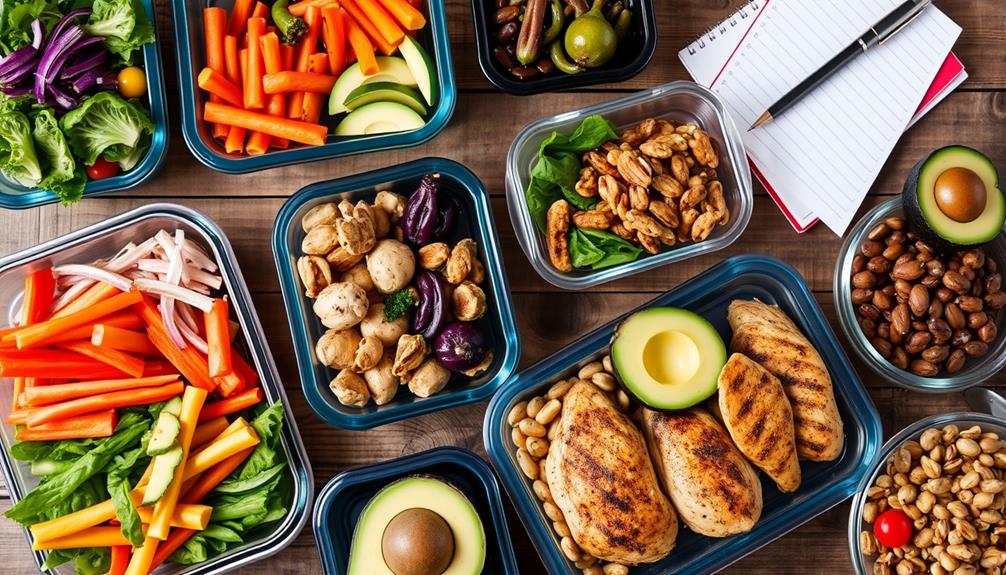
Your meal planning plays an essential role in successfully following the keto diet. Start by planning your meals in advance to guarantee you stay within the recommended daily carb limit of 20-50 grams. Focus on incorporating high-fat, low-carb foods like avocados, fatty fish, and leafy greens into your meals.
Understanding the importance of coffee entrepreneurship can also inspire you to create unique coffee-infused keto recipes, adding variety to your diet. Variety is key; mix proteins, healthy fats, and non-starchy vegetables to prevent monotony and potential nutrient deficiencies.
Create a shopping list based on your meal plan. This will streamline your grocery shopping and help you avoid high-carb items that could derail your keto progress. When you're hungry, having keto-friendly snacks like hard-boiled eggs, cheese, and nuts on hand can provide quick energy boosts while keeping your carb intake in check.
Consider batch cooking or meal prep for the week. Preparing meals ahead of time saves you time and guarantees you have compliant meals ready to go, making it easier to stick to your diet.
Essential Foods and Snacks
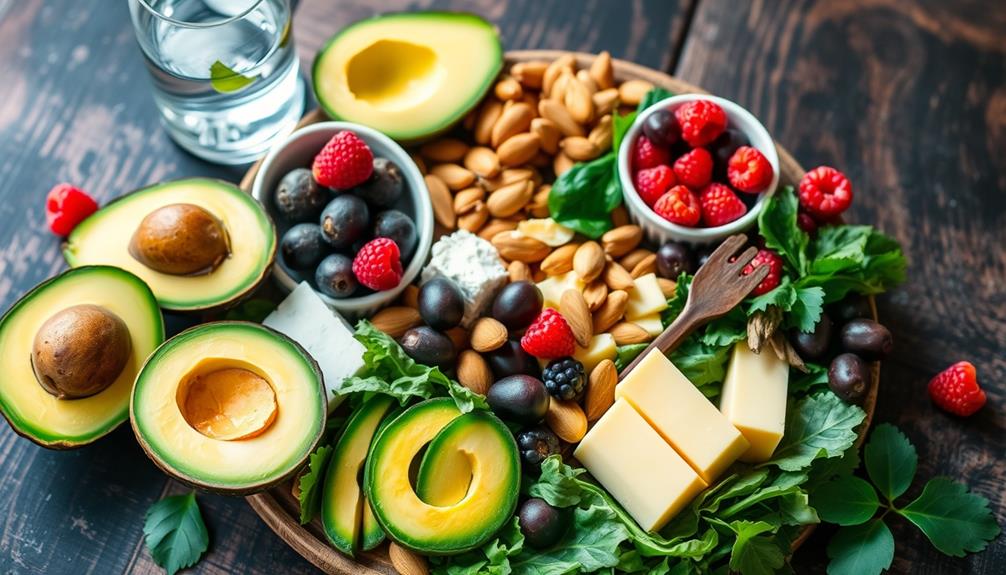
Successful meal planning sets a strong foundation for incorporating the right foods and snacks into your keto diet. Focusing on fundamental foods will help you maintain a state of ketosis while enjoying satisfying meals. Here are some key food categories to take into account:
- High-fat items: Avocados, olive oil, and nuts provide healthy fats and keep carbohydrate intake low. Including foods rich in antioxidants, such as celery juice benefits, can also enhance your overall health.
- Protein sources: Grass-fed beef, fatty fish, and poultry are essential for muscle maintenance and satiety.
- Non-starchy vegetables: Spinach, broccoli, and cauliflower are low in carbs and high in nutrients, perfect for filling meals.
- Acceptable keto snacks: Hard-boiled eggs, cheese, macadamia nuts, and pork rinds are low in carbohydrates and high in fats.
In addition to these foods, staying hydrated is important. Opt for water, black coffee, and unsweetened tea, as they contain no carbs and support hydration without affecting ketosis.
Don't forget about full-fat dairy; it can be a delicious addition to your meals. By incorporating these fundamental foods and snacks, you'll enjoy a variety of flavors while adhering to your ketogenic diet.
Resources for Success
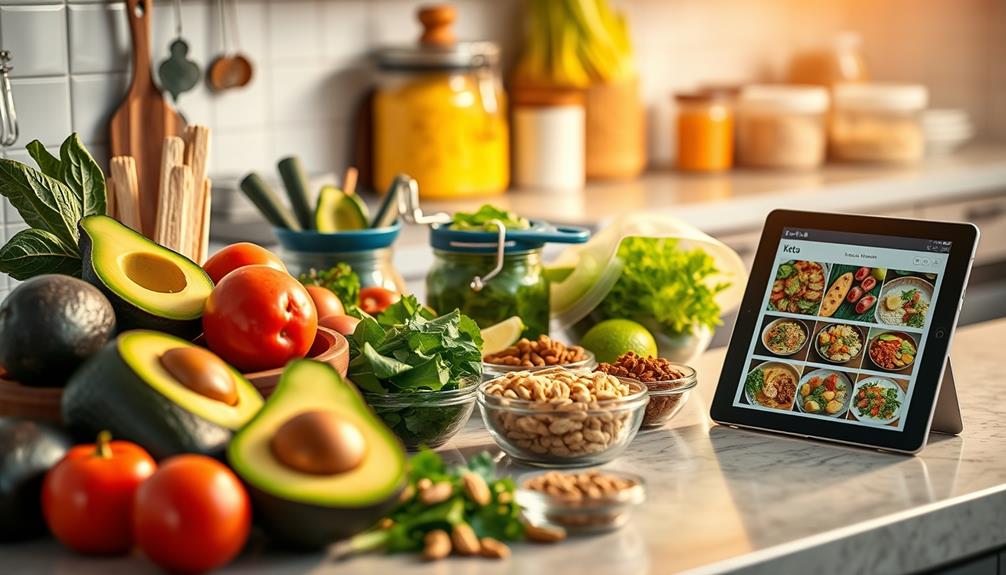
To thrive on a keto diet, leveraging the right resources can make all the difference. Start by utilizing meal planning tools and apps, like the Senza App and KetoDietCalculator, to track macronutrients effectively. These tools help you manage your calorie intake and maintain nutritional ketosis, ensuring your food choices align with your goals.
Additionally, understanding the importance of a budget for your grocery shopping can help you stay on track financially while adopting new dietary habits.
Consider exploring reputable cookbooks, such as "Keto: The Complete Guide to Success." They offer a variety of easy-to-follow recipes tailored for healthy keto living. Engaging with a support community through online forums can also be invaluable. You'll find others who share their experiences, tips, and recipes, enriching your keto journey.
For personalized guidance, consult with a registered dietitian or healthcare professional specializing in ketogenic diets. They can help address any health concerns or nutritional deficiencies you might face.
Additionally, structured programs, like the Cleveland Clinic Functional Ketogenics Program, provide extensive approaches to safely implementing a ketogenic diet for weight loss and health improvement. By utilizing these resources, you'll set yourself up for success on your keto journey!
Frequently Asked Questions
What Is a Keto Diet Plan for Beginners?
A keto diet plan for beginners focuses on low-carb foods, limiting your intake to under 20 grams of net carbs daily. Emphasize healthy fats, proteins, and whole foods while avoiding sugars and high-carb items.
What Is the Simplest Way to Do Keto?
You might think keto's too complicated, but it's not! Focus on limiting carbs to under 20 grams daily, choose healthy fats and proteins, and meal prep to stay consistent. It's simpler than you expect!
What Is the Best First Meal for Keto?
For your first keto meal, try a spinach and cheese omelette. It's quick, delicious, and keeps carbs low while providing healthy fats. You'll feel satisfied and energized, setting a great tone for your day.
What Are the 9 Rules of Keto?
You should focus on nine key rules for keto: limit carbs, prioritize healthy fats, consume moderate protein, choose whole foods, avoid sugars and grains, track your macros, stay hydrated, plan meals, and adapt as needed.
Conclusion
Incorporating the keto diet into your life can be like setting sail on a new adventure. By understanding the fundamentals, embracing the benefits, and being mindful of potential risks, you're well-equipped for smooth sailing. With simple meal planning and the right foods, you'll navigate your way to success. Remember, every journey has its challenges, but with the right resources and determination, you'll find your rhythm and thrive on this low-carb journey. Bon voyage!
